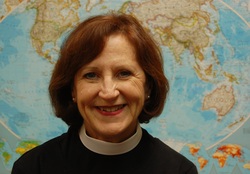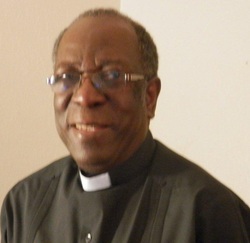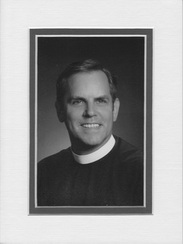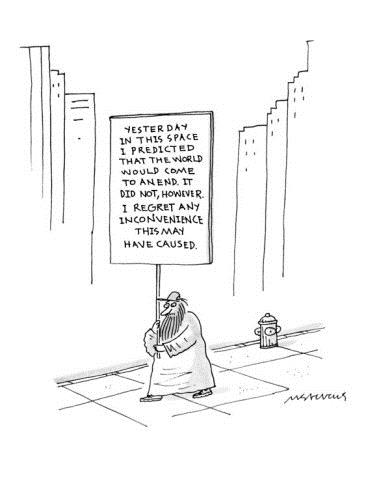 Amos 4 Psalm 110 Matthew 12
Matthew’s gospel evokes a pattern, a weaving of ‘old’ testament, the Hebrew scriptures undergirding this Gospel. Matthew is a synoptic Gospel – looking a lot like Mark and Luke, but pulling on deeper strands of tradition.
Now, the only thing I have ever physically woven is a pot holder – remember those? I am sure the potholder making kit was a birthday gift given back and forth between friends and cousins in many families now of a certain age. The kit came with a frame - a plastic loom - and supply of multicolored bands that seemed like large fabric rubber bands that looped over the grooves in the plastic frame. Not exactly intricate weaving.
But Matthew’s old testament strands are the warp and woof of the gospel and are really fundamental and intricate elements of the structure of this Gospel. I often use the phrase ‘warp and woof’ but not with first-hand experience... so here is a definition for us, non weavers.
Warp and woof (from http://en.wiktionary.org/wiki/warp_and_woof)
- The threads in a woven fabric, composed of the warp (threads running lengthwise) and woof (threads running crosswise) to create the texture of the fabric.
- (by extension) The fundamental structure of any process or system.
Early on Matthew invokes Moses, and in Chapter 12, images from the Hebrew scriptures are continued: Can this be the Son of David? (v23) And, there is the teaching moment in retelling the signs of Jonah (v28-42) The Harper Collins Study Bible footnotes link this story back to Isaiah, Jonah, 1 Kings and the Wisdom of Solomon. - Jesus says, you have seen the signs…and something greater than Solomon is going on here.
These old testament accounts are part of our warp and woof, and surely this ‘new’ testament comes to fulfill the old and not to usurp it. But make no mistake, the new is here. Just because your mother and father and others in this generation are wanting to take you back… look ahead. In v49-50, Jesus points to his disciples and says “Here are my mother and my brothers! For whoever does the will of my Father in heaven is my brother and sister and mother.”
So, which sacred stories are parts of your warp-and-woof? What do you take from Matthew this time around, to strengthen your fundamental structure of faith?
 The Bible Challenge, Day 316: Amos 3, Psalm 109 and Matthew 11
As a young adult after my first batch of higher education, I was a subscriber to the New Yorker magazine. My introduction to the New Yorker came in my teenage years at home, where I snagged each issue when it arrived and flipped through its pages to enjoy the cartoons. Inevitably at least one of them would feature a ragged, bearded prophet standing on a city street carrying a placard proclaiming doom in one fashion or another. My memory is that the prophet’s words are offered in vain, since no one pauses to listen except the magazine’s reader. When I read the prophet Amos’ pronouncement of woes soon to come, I picture that New Yorker doomsday prophet.
But the challenge of divine judgment is to stop, look and listen. The appropriate response is to wonder how we are contributing to the misery of the world and to the sorrow of God, starting in the places where we live, work, study and otherwise spend our days. For when we pause to listen to God’s criticism from the mouth of God’s prophet or God’s Son, then we have an opportunity to see the truth we try to hide from our own awareness – the truth of our self-concern, our blindness to our own faults, and our deafness to the sobbing of the desperate. This truth, humbly welcomed, leads us to the kind of repentance that changes our focus from ourselves to our neighbors. That turning is the Holy Spirit’s tool for renewing the face of the earth.
However, it is also easy to succumb to the delusion that our assessment of bad behavior and bad people is in line with God’s view. Then we rant like the author of Psalm 109 – pleading that our God who wants to set the world right again will smite our personal enemies and will bless us instead. As I read Psalm 109, I want to shake my head in mocking dismissal, mumbling with Christopher Robin, “Silly old Pooh!” But then I wonder whether I just may have the capacity to echo the psalmist’s sentiment, and if truth be told, I must admit that I can.
Life is woe when we forget who we are – beloved children of God, equipped to carry God’s love in action into a woe-filled world.
What is Jesus trying to teach you today about yourself?
What is your growing edge?
What pain of another does God want you to see and hear today?
Pause to wonder and take courage to respond.
 Amos 2, Psalm 108, Matthew 10
In this second chapter of the Book of Amos, the sins of the people are denounced by the Lord God who promised chastisement to these places, Moab, Judah, Israel. Each denouncement starts with the words “For crime after crime…I will grant no reprieve.” Prophets, Warriors, horsemen shall all pay for their crimes. The warrior shall not save himself, thee archer shall not stand his ground…on that day the bravest of warriors shall be stripped of his arms and run away. This is the very word of the Lord.” (Amos 2:14-16)
There are however those remnant of the people who are willing to confess God among the peoples, “I will confess thee among the peoples…deliver those that are dear to thee “Save with thy right hand and answer” (Psalm 108:3-6).
Clearly our God is a loving God yet also a just God who hates iniquities and injustices. Therefore those who will follow our God’s precepts must be ready and willing to face a hostile world without fear or care for tomorrow. “No man is worthy of me who cares more for father or mother than for me. No man is worthy of me who does not take up his cross and walk in my footsteps” (Matthew 10:36-38.)
Such is our calling but great is the reward for all who follow the Lord.
The Venerable J. Fritz Bazin, D. Min.
Archdeacon for Immigration and Social Justice Ministries
Diocese of Southeast Florida
 Reflection for November 15 or Day 313
Amos 1, Psalm 107 and Matthew 9
As I read Amos and and Psalm 107 I was struck by this contrast: Amos speaks with a fierce, fiery intensity of God’s impending judgment against Israel’s neighbors and the Psalmist speaks with a rhythmic, confident assurance of God’s steadfast love. In Chapter 1 of Amos, five different peoples are condemned by God, their multiple transgressions noted followed by the vivid punishment God will bring. In Psalm 107, five times the psalmist reminds us of the steadfast love of the Lord that endures forever. The scriptural revelation of God’s character is multidimensional. God is not indifferent to violent, hurtful patterns in human communities and people, as Amos and the prophets so clearly remind us; But neither is God’s love capricious and selective -- God’s love is steadfast and enduring, as the psalmist so beautifully reminds us. “Let those who are wise give heed to these things”, the psalmist aptly concludes.
Chapter 9 of Matthew provides another dimension of God’s character as revealed in the ministry of Jesus: God heals. This chapter portrays Jesus’ as a kind of traveling MASH unit. In this chapter alone a paralytic, woman with a hemorrhage, a girl near death, two blind men and a mute are healed by Jesus. At times Jesus commends the faith of the others, for example those who carried the paralytic, the faith of those seeking to be healed, as with the blind men and sometimes just the the faithful act of reaching out to touch Jesus, as with the woman with the hemorrhage. This chapter underscores that Christ-centered communities are hospitals for sinners and not museums for saints, one of my favorite definitions of the church.
This chapter ends with a summons that God invites to enter into his work of healing and renewing lives -- “the harvest is plentiful but the laborers are few; therefore ask the Lord of the the harvest to send laborers into his harvest.” Again, as the psalmist says, “let those who are wise give heed to these things”.
Andrew Sherman
 Joel 3, Psalm 106, Matthew 8
Todd McGregor
As I finish up my sabbatical in Jerusalem, I’m reminded of the holy city which is talked about in Joel 3:17. Presently, there are three major religions which have deep roots here in the Holy City. The Jews have the Western Wall commemorating the Temple; the Muslims have The Dome of the Rock and the Al-Aksa ("the remote") Mosque, while the Christians have Church of the Holy Sepulche and many other holy sites.
It is here where millions and millions of pilgrims come each year to deepen their faith in this Holy City. It is here where pilgrims seek answers to their life. It is here in the holy land and in the Holy City where pilgrims sense God’s presence and direction.
It is here at the Holy City where I have been led to write my autobiography, to write my pilgrimage throughout my brief life. I didn’t have a whole lot of expectations except I wanted to complete it for my girls and family. After finishing the first draft, I then went through it a second time and it was here where God revealed a number of things to me. First, the web of life was connected and I started making more sense of things which had happened in my life at different periods and how they all seem to connect. God was preparing me for his service long before I had any idea. Secondly, some painful events in my life brought up unconfessed sin and forgiveness. Events which I thought were handled badly by others were actually the right decisions. But I was angry at them for what they did to me or not do. It was all about narcissism. Yet God allowed me to go deep in my pilgrimage to free me up. God allowed me to enter into his holiness so he could begin to heal me.
As pilgrims on a spiritual journey and sacred destination, it is those places and moments of holiness where God meets us and changes us. I hope and pray that today you will have a holy moment.
Serving Christ Together,
+Todd Toliara
 Day 311 – Joel 1-2, Psalm 105, Matthew 7
My dear mother is a native Floridian. She’s lived here most of her life – and seen more than a few hurricanes. To this day, if I dream aloud of living in this charming home or that historic neighborhood, she will ask, “Is it in a flood zone?” or “Do they have to evacuate in a storm?” It’s become a running joke in my family.
I used to regard my mother’s questions as a wet blanket thrown on my domestic reveries, but I’ve learned to value her insight. Low-lying areas and coastal structures will eventually be tested by Florida storms. It’s realistic to inquire if I would be prepared for that day.
Beginning in Matthew five, Jesus explicated the ways of the Kingdom of Heaven: Love your enemies. Give alms in secret. Don’t worry. Today he concludes his sermon on the mount. Do what I teach, Jesus says, and you will be like the wise man that built his house on rock. But neglect my words and you will face the consequences, like the man who built his house on sand. The storm came – without a single Doppler forecast! – and the house was swept away.
Hurricane shutters and a good insurance policy weren’t options in Jesus’ day.
This scenario would have meant utter ruin. Matthew’s Jesus calls his followers to action and obedience – not to stifle us, but to show us the path of true life.
The prophet Joel sheds another light on catastrophe. He tells of a calamity happening to Judah in real time, probably between 500 and 300 BCE (scholars disagree on the date). An army of locusts had devoured the crops, and a drought turned things from bad to worse. Joel calls all the people to lament and cry to God. But when things look most grim, God takes pity on the people. Painful circumstances give way to assurance that Yahweh is indeed near.
Human suffering is very real, even excruciating. Yet Scripture teaches again and again that God meets us in our pain, bringing new life, restoration, even resurrection. In the midst of the most violent storm, our hope is in God.
Susan Beebe

Daily Blog – Day 310, Hosea 13-14, Psalm 104, Matthew 6
I will sing to the Lord as long as I live;
May my meditation be pleasing to him,
Let sinners be consumed from the earth,
Bless the Lord, O my soul!
I will sing praise to my God while I have being.
For I rejoice in the Lord.
And let the wicked be no more!
Praise the Lord! (Ps. 104:33-35)
The words of Hosea for today have God remembering all that God has done to
bring the people of Israel through the wilderness. Though they continued to turn
to idols and false gods, though they put their trust in earthly rulers instead of
heavenly guidance, God continued to deliver and save them. “Return, O Israel, to
the Lord your God” is the constant plea of the prophet. What we discover is that
our sinful ways can only lead to death and destruction; with God there is only life
and growth. When we put our ways before God, there is only emptiness and loss;
but with God alone there is true and everlasting life.
Our Psalm proclaims that all that we ever need, or could desire, or have is from
God alone. God provides all things and in such are everlasting joy and life. This is
such a contrast to following idols and our own selfish desires as we are consumed
today by a culture of getting and spending.
Matthew 6 has Jesus laying out for us the life of a follower, a believer who seeks
to know and do God’s will. It is a private and quiet way of living in following
the simple disciplines of fasting, prayer, self-denial, and loving service. These
disciplines provide all that is necessary for an anxious free, calm, and quiet life
in contrast to the consumer mentality of our culture. It is a reminder that this is
what God has intended for all times and ages. We are called upon simply to trust in
God’s grace and all that he will provide, for as the psalmist reminds us, all that we
ever need comes from God.
__________________________________
The Very Rev. Dr. William L. Stomski,
Chaplain and Sacred Studies Educator, Saint Joseph’s Episcopal School, Boynton Beach
Dean of the Diocesan School for Christian Studies
 Bible Blog
Hosea 9-10, Ps 102, Matthew 4
Fifteen months ago, Archbishop Ian Ernest asked me to serve the parish of St. Simon the Fisherman in Tamarin, Mauritius. I was drawn to the idea of resting my brain from constant translation into Malagasy and speak in my mother tongue. Secondly, I was asked to be the first woman priest to serve with the Diocese of Mauritius. The diocese had approved women’s ordination four years earlier, but did not have a woman to pave the way. It was an honor to be considered a leader, role model and pioneer for women in ministry. After prayerful consideration and swaying of my husbands’ opinion, we agreed and this time was used to re-fuel my personal tank, spiritually, emotionally, mentally and physically. I had come from a place of indifference. After 22 years of missionary service I was burnt-out and despondent. I had no fight left in me. A friend described me as “numb.” I needed a change and I took the Archbishop up on his offer.
As I arrived in Mauritius I developed a game plan. Besides offering love, council and pastoral duties to my congregation and the Diocese of Mauritius, I was also intentional about living in a manner consistent with uncontainable joy. I asked God to give me the courage to act the way I would act if he were physically in my presence encouraging me. I rested, wrote goals, read books, listened to my inner voice, penned in my journal, and gained strength from making new friends and taking beach walks, intentionally choosing a pathway to healthy living. I was learning to run a lifestyle pace for the marathon, not the sprint, enabling me endurance for the long race still ahead. Fifteen months later, with my personal fuel tank refueled, the appointment to Mauritius has come to an end and I return to Madagascar in just over a week.
In Psalm 102 appointed for today, we read the prayer of an afflicted man, when he is faint and pours out his lament before the Lord. He asks God to make himself known to him, even when in a state of despair. The Gospel of Matthew reminds us of Jesus’ temptation. Even as the Son of God, he was led by the Spirit into the desert to be tempted by the devil.
Let us remember that God is faithful to his people. Even when coming from a place of indifference and/or enduring temptation, by the grace of God, we actively participate in the abundant life promised by God, a life in all its fullness.
 November 7, 2013 Day 305 – Hosea 5-6, Psalm 100, Matthew 2
Spencer Potter
Yogi Berra’s saying “It's déjà vu all over again” is an appropriate saying for this second chapter of Matthew. For one thing, we’ve read it before (way back on Tuesday, January 8). As of yesterday, we started over at the beginning of the New Testament. We are reading Matthew, Mark, and part of Luke all over again. It will likely be familiar.
The images in this passage of Egypt, the exodus, and the killing of innocent children, may also be familiar and not only because we read them at the beginning of this endeavor. The images may also be familiar because they are similar to the Old Testament accounts of Moses. Moses was spared from the pharaoh’s killing of the infant male Israelites in Egypt by being placed a basket. Jesus escaped Herod’s slaughter of the innocents by fleeing to Egypt. Moses came out of Egypt into a journey that led his people to the promised land. Jesus comes out of Egypt to bring the Kingdom of God. Moses goes up on Mount Sinai to get the Ten Commandments. A little later in the fifth chapter of Matthew Jesus will go up on a mountain to teach us new commandments about loving all. There are moments all over the beginning of Matthew that bring us back to images of Moses.
In some ways Jesus is the New Moses. Moses brought a people that were enslaved to freedom. Jesus takes a people that are bound by sin and set them free. This freedom is at the heart of the gospel. This freedom comes from his redemption of the world. At St. Andrew’s in Palmetto Bay there is a pressed stained glass window of the Annunciation. In this window, Gabriel carries Easter lilies, as he announces pregnancy to Mary. These Easter lilies are a foretelling of the death and resurrection that is to come. In the same way these allusions to Moses in the infant characteristics of Jesus predict a redemption and release that is to come. It is like déjà vu all over again, and déjà that foreshadows.
Keep reading!
 Wednesday, November 6, 2013, Day 304 – Hosea 3-4; Psalm 99; Matthew 1
“Proclaim the greatness of the Lord.. for the Lord our God is the Holy One!”
The Psalmist’s words above are the essence of Hosea’s message to Israel – the Northern Kingdom -- in the days before their captivity. Israel was quite different from Judah – the Southern Kingdom -- in the 8th century BC. The land of the north was very fertile and trade access, due to its geographical location, made the area much more cosmopolitan than that of its sister Judah in the south. Remember that this is the land of Elijah and Elisha and their bouts with the prophets of Baal. The people of Israel are in a serious position of temptation of being drawn in by “other gods.’ Their agricultural lives were much connected to the Canaanites and the fertility gods of the Canaanite lands. Gene M. Tucker, in his Harper Collins Commentary suggests these aspects of Israel’s life and culture test their theology. “Who makes the land produce the harvest; Is it Yahweh or Baal?” Even more dangerous than choosing one God over another is the question Tucker suggests; “Is it possible to give allegiance to more than one deity.”
Hosea’s words are very earthy as he speaks in family metaphor stressing relationships. The image of the Lord telling Hosea to take an adulterous woman and love her is the means of saying that even though Israel is Unfaithful, God continues to love her. But there will be consequences. Hosea will buy the adulterous woman but put her in isolation just as Israel will be isolated in the captivity which will befall them. The next verses and those that will follow over the next few days will be more direct Prophetic proclamations with additional metaphoric narratives, but all contrasting the faithfulness of God and the Unfaithfulness of God’s People.
Our own culture provides many modern day equivalents to the worship of Baal the gods of the land or [in our case] the gods of our own economic temptations. We too have a very fertile country, and our relationships are extremely cosmopolitan and of mixed levels of faithfulness. Just as those being challenged by Hosea’s words we must challenge ourselves not simply with the question, ‘is God my God; but is God my only god.’
“Proclaim the greatness of the Lord.. for the Lord our God is the Holy One!”
As we look again at the Gospel of Matthew, we open in this first chapter with the genealogy of Christ. Matthew’s purpose and emphasis in this first chapter is that this story of Jesus is a Jewish story and the fulfillment of the promises and Faithfulness God has maintained for ever being recorded in the generations between Abraham and David; David and the Babylonian Exile; and the Exile to Jesus.
“Proclaim the greatness of the Lord.. for the Lord our God is the Holy One!”
In this season of parish Stewardship programs we have opportunity to apply these lesson from Hosea, the Psalmist and Matthew by recommitting our own Gifts of time, talent and treasure. There is one God! All things come from you, O Lord and of your own have we given you.!
The Ven. Thomas A. Bruttell
Archdeacon for Transitional Ministry
Diocese of Southeast Florida
|












 RSS Feed
RSS Feed